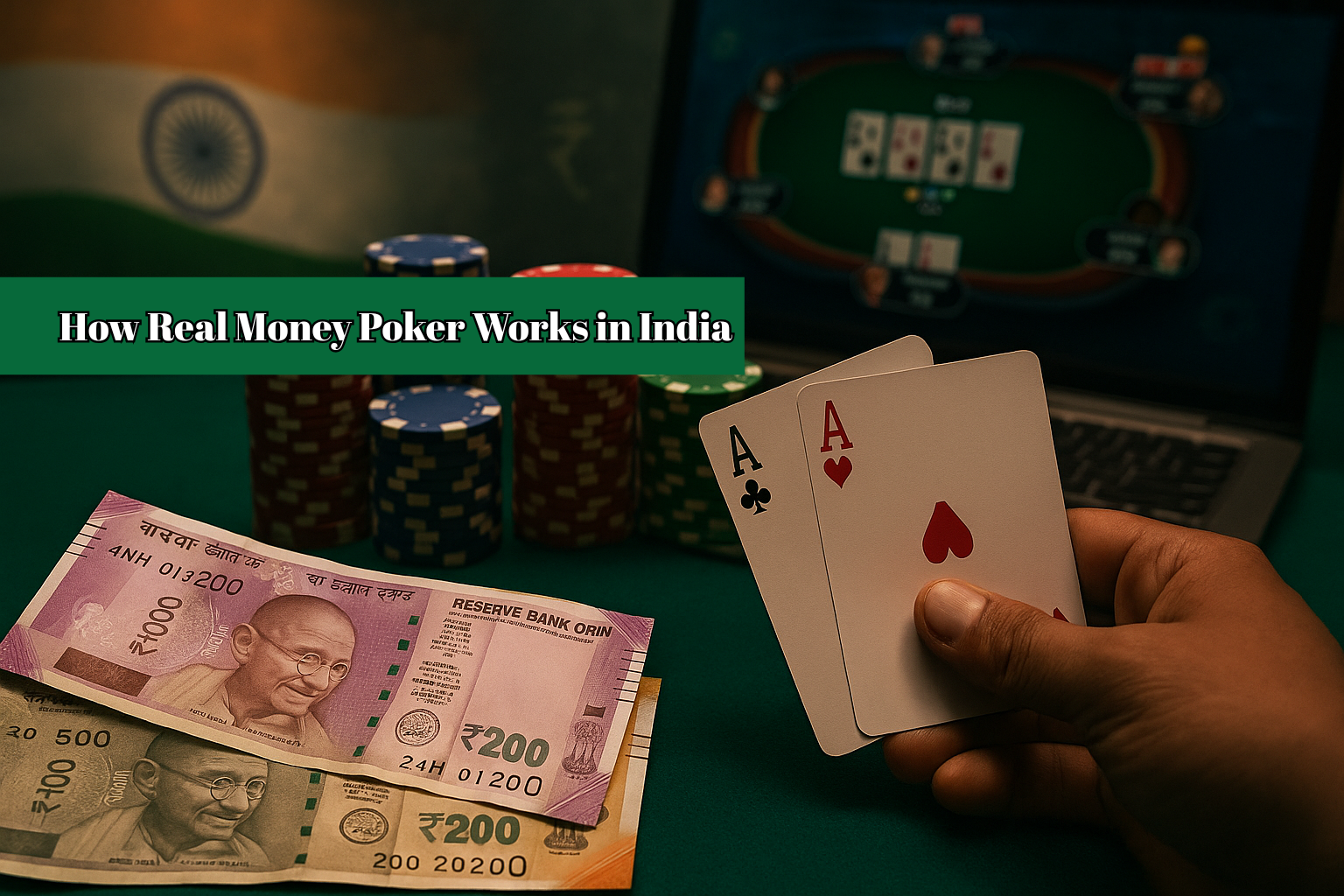How Real Money Poker Works in India
Poker has emerged as one of the most popular card games in India, with a growing number of players turning to online platforms to play money poker for real money. While poker and Rummy games have long been favorites in social gatherings, their transition to the digital realm has introduced millions of Indians to the thrill of strategic gameplay combined with the opportunity to win real cash. But how does real money poker actually work in India? Let’s break it down.

1. Understanding the Basics of Poker
At its core, poker is a skill-based card game where players bet against each other based on the strength of their hands. There are several variants like Texas Hold’em, Omaha, and Seven-Card Stud, but Texas Hold’em is by far the most popular format on Indian platforms.
Each game, including Teen Patti Stars, involves a mix of strategy, psychology, and probability. Players must decide whether to bet, raise, call, or fold depending on their cards, the actions of other players, and the probabilities of improving their hands.
2. Legality of Real Money Poker in India
One of the most frequently asked questions is whether playing poker for real money is legal in India. The answer is nuanced.
Under Indian law, games of skill are allowed in most states, whereas games of chance are typically restricted or banned. Poker has been recognized as a game of skill by several high courts in India, reflecting the evolving culture in India, including in Karnataka and West Bengal. However, the laws vary by state:
- Permitted: States like Goa, Sikkim, West Bengal, and Nagaland have legalized poker and even issued licenses to operators.
- Ambiguous or Restricted: States like Maharashtra and Telangana have restrictive gambling laws that do not clearly distinguish between games of skill and games of chance.
- Online Regulation: There is no central law that governs online poker in India. This legal gray area allows many offshore and domestic poker sites to operate while complying with state-wise legal frameworks.
Always check the legality in your specific state before playing for real money.
3. How Online Poker Platforms Operate
To play real money poker online, players must first sign up with a licensed platform. Popular Indian poker websites include:
- Adda52
- PokerBaazi
- Spartan Poker
- 9stacks
- Pocket52
These platforms offer both free games and real money tables. After account registration, players can deposit funds, join tables, and start playing.
4. Depositing and Withdrawing Real Money
To play for real cash, players need to fund their accounts using various payment methods:
- UPI (Unified Payments Interface)
- Net Banking
- Debit/Credit Cards
- E-Wallets (Paytm, PhonePe, etc.)
- Cryptocurrency (some offshore sites)
Withdrawals are usually processed through bank transfers or UPI, and players need to complete a KYC (Know Your Customer) process to verify their identity.
Most money poker platforms have minimum and maximum deposit and withdrawal limits. Let me know if you’d like it phrased differently. They also ensure player funds are kept separate from operational funds, increasing financial security.
5. Game Formats Available
Real money poker in India is available in multiple formats:
A. Cash Games
Players buy-in with real money and can join or leave the table at any time. Blinds (mandatory bets) are fixed and vary based on the stakes. Winnings are instantly reflected in the account.
B. Tournaments
Tournaments have a fixed buy-in and a scheduled start time. Indian players compete to win a share of the prize pool, which is formed by combining all entry fees. Unlike cash games, you cannot rebuy chips (unless specified).
C. Sit & Go
These are mini-tournaments that start as soon as a certain number of players join (e.g., 6 or 9). Perfect for quick gameplay.
D. Freerolls
These are free-to-enter tournaments with real money prizes, ideal for beginners who want to experience real money poker without financial risk.
6. Rake and Fees
Online poker rooms charge a rake, which is a small commission from each cash game pot or a portion of the tournament entry fee. This is how platforms earn revenue. Rake percentages are usually between 2% to 5%, with a cap depending on the table stakes.

7. Taxes on Winnings
According to Indian tax laws, any winnings from online games, including poker, are subject to taxation:
- 30% TDS (Tax Deducted at Source) is applied on winnings above ₹10,000.
- Players are required to provide their PAN (Permanent Account Number) during withdrawals.
- The tax is deducted before the winnings are credited to your account.
It’s advisable to maintain a record of your poker income and consult a tax professional for annual filings.
8. Responsible Gaming and Player Safety
Reputable Indian online poker sites implement responsible gaming policies, which include:
- Self-exclusion options
- Deposit and loss limits
- Time-out features
- Helplines for gaming addiction
The objective is to ensure that money poker remains a fun and competitive activity, rather than a compulsive or harmful one.
9. Skill vs. Luck in Poker
Poker is not purely a game of chance. In fact, consistent winners at real money poker tables are those who understand:
- Mathematical probabilities
- Bluffing and reading opponents
- Position play
- Bankroll management
While luck plays a role in the short term, long-term success depends heavily on skill and strategic decision-making. That’s why poker has gained recognition as a game of skill under Indian law.
10. Live Poker vs. Online Poker in India
Though live poker rooms exist in casinos in Goa and Sikkim, the vast majority of Indian players engage in online poker due to convenience and accessibility. Online platforms also offer features like:
- Multi-tabling (playing multiple games at once)
- Player statistics
- Interactive tutorials
- Real-time customer support
The anonymity of online play allows new players to learn without feeling intimidated, while experienced players can find high-stakes games 24/7.
11. Growth of Poker in India
India’s online poker industry is growing rapidly, thanks to:
- Affordable mobile internet
- A rising middle class with disposable income
- Increasing awareness of poker as a mind sport
- Poker celebrities and influencers promoting money poker
Events like the India Online Poker Championship (IOPC) and PokerBaazi’s National Poker Series are helping to legitimize and promote the game further.
Conclusion
Real money poker in India has evolved from a niche hobby into a vibrant industry supported by modern technology, legal backing in certain regions, and a growing player base. With its unique blend of strategy and excitement, poker offers a compelling gaming experience — especially when played responsibly.
Whether you’re a beginner looking to dip your toes or an experienced player chasing big pots, India’s online poker scene offers a secure, skill-based, and rewarding environment for everyone.
Just remember: know the laws in your state, play on trusted platforms, manage your bankroll wisely, and never wager more than you can afford to lose. Money poker is a game of skill — but the smartest move is always to play responsibly.








